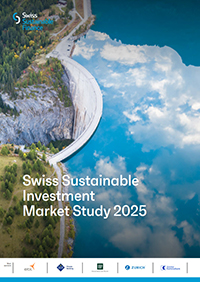Despite complex geopolitical developments and macroeconomic uncertainty, sustainability-related investments in Switzerland totalled CHF 1,881 billion at the end of 2024 according to the Swiss Sustainable Investments Market Study 2025 – an impressive 13% increase from the previous year.
“After the initial enthusiasm followed by a weak performance in the last two years, sustainability-related investing has gained maturity and is now on a more realistic growth trajectory.”
Robert de Guigné, Group Head of Sustainability
The Swiss Sustainable Investment Market Study, an annual report published by Swiss Sustainable Finance (SSF), has been recording the volume of sustainability-related investments in Switzerland for eight years now; the latest edition shows several positive developments.
In addition to the overall growth, the study found an increasing maturity of sustainable investment practices, with a growing trend towards combining several approaches and a rising focus on results-oriented approaches.
Thematic sustainability investments (+16%), climate alignment (+33%) and impact investments (+27%) developed particularly strongly in 2024, while ESG engagement has moved up from fourth to second place in the ranking of investment strategies, highlighting the increasing relevance of active stewardship in the financial sector to promote positive change.
While institutional investors have so far been the driving force behind the growth of sustainable investments, the proportion of private investors rose significantly for the first time in four years, from around 28% to 33%.
Banks and asset managers cite client demand and their own competitive advantages as the most important motivations for sustainable investments, while a strategic push from boards and senior management represents the primary driver for institutional investors.
When it comes to asset classes, institutional investors invest predominantly in corporate and government bonds (55% together), followed by property (24%), reflecting their focus on stable returns and low volatility. Asset managers, on the other hand, prioritise equities the most (33%), followed by corporate bonds (18%). Additional allocations to private equity and infrastructure investments show the growing interest in broader diversification by including private markets in sustainable portfolios.
UBP is proud to feature among the report’s sponsors and survey respondents. The report can be accessed by clicking on the image below.










